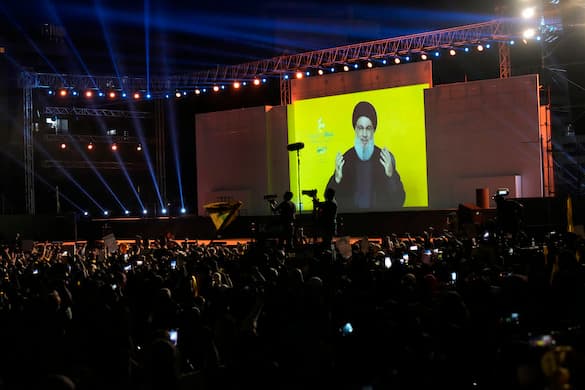With Hezbollah Attacking, an Israeli War With Lebanon Is Looking More Likely
‘We will not tolerate the threats posed by the Iranian proxy, Hezbollah, and we will ensure the security of our citizens,’ the Israeli defense minister says.

Is an all-out war between Israel and Hezbollah inevitable? Despite efforts by President Biden’s envoy, Amos Hochstein, the Israeli-Lebanese border seems on the verge of igniting.
Following a meeting with Mr. Hochstein on Thursday, Israel’s defense minister, Yoav Gallant, visited the northern border. “There is a short window of time for diplomatic understanding, which we prefer,” he said, adding, however, “We will not tolerate the threats posed by the Iranian proxy, Hezbollah, and we will ensure the security of our citizens.”
Hezbollah has been attacking Israeli border towns daily since October. Several rockets were lobbed from Lebanon Friday at Kiryat Shmona, the largest city in the region. Like other towns there, it is almost empty of civilians. More than 60,000 residents of northern Israel have been evacuated from their homes near the border.
“Residents of northern Israel must know that they won’t return home until the criminal Gaza war ends,” Hezbollah’s chief, Hasan Nasrallah, said Friday in his second threat-filled speech of the week. As he did on Wednesday, he vowed to avenge this week’s killing of a Hamas leader, Saleh al Arouri, near Hezbollah’s Beirut headquarters.
“We cannot sit quietly in the face of an assassination in the middle of the war, and the assassination will not go unpunished,” Mr. Nasrallah said Friday. “The response is coming. The decision has already been made. The matter now depends on what will unfold on the ground and on Allah.”
Yet, many Israelis and Lebanese doubt that the Hezbollah chief is looking for an all-out war. “Hezbollah can already claim it has liberated the Galilee,” a Beirut-based economist, Nadim Shehadi, tells the Sun. “Nasrallah doesn’t want war. He’s bluffing. All he wants is the current state of war to continue.”
The situation at Galilee is a mirror image of the 1980s, when the Israel Defense Forces occupied a “security belt” in southern Lebanon to keep Hezbollah off its border. Now, that belt has moved to the Israeli side, where the IDF is present and only a few civilians stay.
After the Israeli-Hezbollah war of 2006, the United Nations Security Council created the UN Interim Force in Lebanon, an international armed contingency charged with maintaining a 20-mile area free of armed militias between Lebanon’s Litany River and the Israeli border.
Yet, over the years Hezbollah’s well-armed and well-trained Radwan force has all but taken over southern Lebanon. Even prior to the current war, armed Hezbollah men could be seen from the Israeli side of the border without the help of binoculars.
Operating right next to Unifil posts, they menaced Galilee residents. Missiles, drones, and anti-tank rockets were amassed in southern Lebanon. The IDF exposed tunnels designed to infiltrate Israel.
Now, Mr. Hochstein is attempting to convince Hezbollah to withdraw its forces back to the area north of the Litany river. In return, America is reportedly offering help in securing the selection of a Hezbollah-favored Lebanese president, a position that has been vacant for months as part of a political standoff at Beirut.
Mr. Nasrallah scoffed at the American diplomacy, and Mr. Hochstein canceled a planned Beirut visit this week. Next week, Secretary Blinken is scheduled to travel to the region, as European envoys also try to coax Mr. Nasrallah. A large sum of foreign cash could help Lebanon out of its deep economic crisis and avert war.
America has also reportedly offered to mediate over 13 border spots that Hezbollah claims as Lebanese. Mr. Naasrallah used to justify his armed force as resistance to Israeli occupation. “Now it’s looking for an occupation to resist,” Mr. Shehadi says.
Israel is far from eager to open a full-blown northern front as it fights Hamas in Gaza. Yet, officials vow to create the conditions that would allow northern residents to securely return home. To do that, the IDF, which for now is mostly reactive to Hezbollah, will likely have to be more proactive.
“It’s tricky. The IDF must do more than it has, but stop short of an all-out war,” a former director of the Israeli foreign ministry, Alon Ushpiz, told channel 11 Television. “We must apply enough of a military stick to create incentive for Nasrallah to agree to a diplomatic carrot.”
On the other side, Mr. Nasrallah’s response to the killing of al-Arouri, who he has called “my friend,” could ignore a much larger war if it exacts a large number of Israeli casualties. Also, even if the Radwan force is pushed 20 miles north of the border, many northern Israelis fear returning home as long as Hezbollah remains fully armed.
Nor are the Lebanese confident that a war can be avoided. After all, “in the era of drones and rockets, it doesn’t make much difference” if Hezbollah retreats to the Litani river, Mr. Shehadi says.

